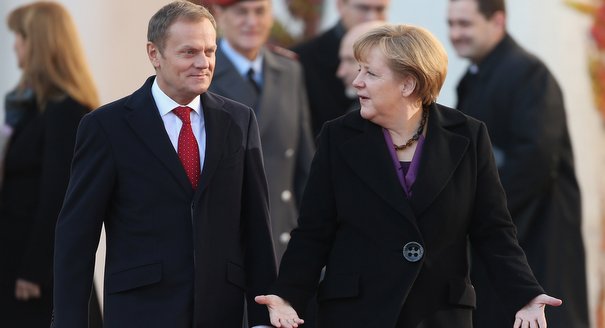Since his election as Prime Minister of Poland in 2007, Donald Tusk has become a frequent visitor to Berlin. He was in the Chancellery again this past Wednesday for the regular German-Polish consultations.
During the talks, Tusk and Chancellor Angela Merkel, who get on extremely well, were busy trying to deal with Britain’s obduracy over the EU’s new budget for the 2014-2020 period.
David Cameron, the British Prime Minister, is now committed to reducing the EU budget after rebellious lawmakers from his own Conservative Party and the opposition Labour Party obtained enough votes to curb EU spending.
The EU budget is very important for Poland and the other countries of Eastern and Central Europe. It is the source of much of the billions of euros that they are spending on modernizing their infrastructures, from water and sewage systems to roads and bridges, and of course the railways.
Railways are a sensitive issue between Berlin and Warsaw.
For years, successive Polish governments have been trying to upgrade the railway network, including the stock and tracks. The improvements have finally cut the travelling time from the German border to Warsaw.
But it still takes nearly six hours to reach Warsaw from Berlin, a distance of just 500 kilometers. The reason is that the train from Berlin to the border is excruciatingly slow. The railway tracks and electricity systems on the German side of the border have still not been modernized to accommodate high-speed trains. The mobile phone and internet connections are patchy. It is a disgrace, especially when the early morning train leaving Berlin is packed with German and Polish business people stopping off at the bustling city of Poznan (which is on the way to Warsaw).
As Poland’s leading daily, Gazeta Wyborcza, wrote recently, the railway connections are worse than before the Second World War. The train to Warsaw takes two hours longer. And it’s not because of Poland, it added. The Polish government has invested over €100 million in upgrading the tracks going to Western Europe. It is Germany that has dragged its feet.
What a strange deficit in a relationship that has been flourishing in recent years! Those ties, apart from political, include defense, security, and cultural cooperation. But it is the trade ties that say much about how much the relationship has changed—and why a modern railway system is so important.
It is worth skimming through the latest foreign trade figures by the German Federal Ministry of Economics and Technology to see how both countries need each other.
One section of the report shows a table measuring the impact of the euro crisis, called “The 10 countries with the greatest change in German exports shares - between 2010 and 2011.” The first group of five countries shows how German exports have jumped. The second group of five countries shows how German exports have slumped.
Poland is up there in the first group, along with France, China, Turkey, and Russia, which confirms how Polish-German trade has been growing steadily, year after year. That certainly says something about how Poland managed to withstand both the global financial crisis of 2008 and so far, the euro crisis. It is one of the only European countries not to have slipped into recession during the last five years.
By the way, the second group of countries, hardly surprising, includes Greece, Portugal, Italy, Belgium, and Spain.
Another section of the ministry report deals with Germany’s foreign trade partners ranked according to importance in 2011.
In terms of German exports, Poland was ranked tenth, two places before Russia (!). In terms of total trade turnover, Poland was ranked tenth, one place before Russia. What an incredible turnaround for the German-Polish relationship.
It shows the importance of EU membership for the free flow of goods, capital and people. But it also shows how Poland committed itself to modernization, even before joining the EU in 2004. And it seized the advantage of having Germany as its big western neighbor.
The German government should not take its neighbor for granted. Nor should it hinder Polish-German trade. Yet in some cases, that is what is happening.
The state of Brandenburg, which has the longest stretch of border with Poland, has done almost nothing to lobby Berlin to modernize the railway network.
Under the influence of century-old prejudices that still resonate with many Germans, particularly in the eastern part of the country, it fears an influx of Polish immigrants. Yet a state with an unemployment rate of 10.2 percent, an ageing population, and emptying villages, should warmly welcome the arrival of young, motivated Poles.
The problem is not confined to Brandenburg. After all, federal money would be needed to modernize the railways. Yet Merkel, despite her affection for Tusk, has done very little to strengthen the East-West infrastructure, be it trains, roads, or energy pipelines. It is time for that to change. Surely, with German backing, a new EU budget should support the physical integration of Eastern and Western Europe. It is long overdue.






.jpg)